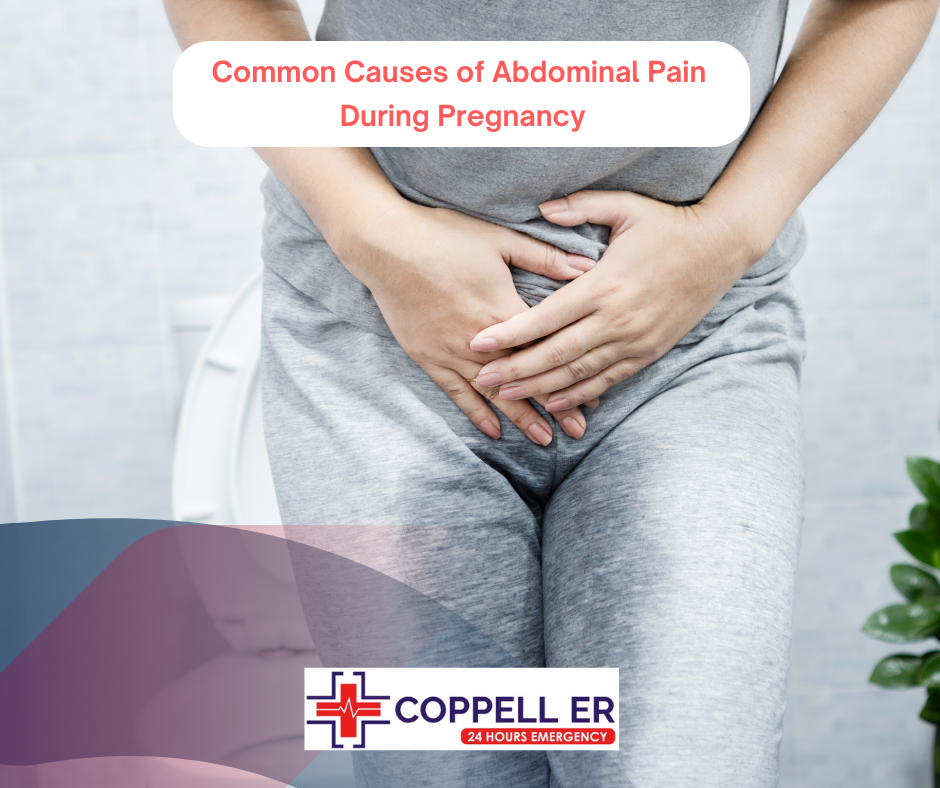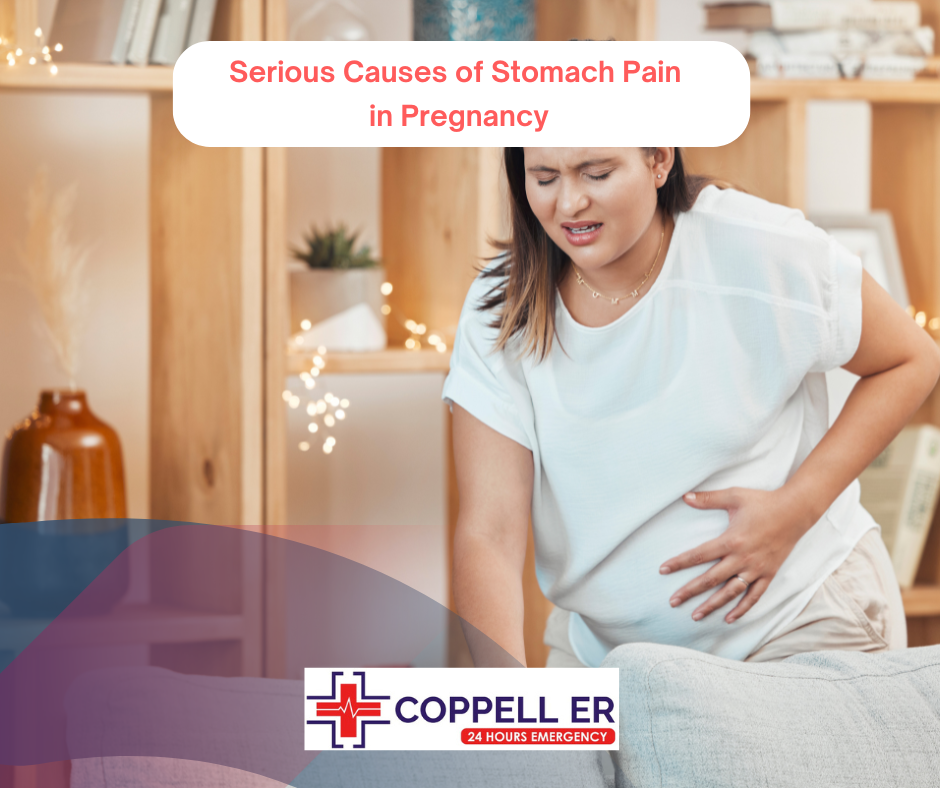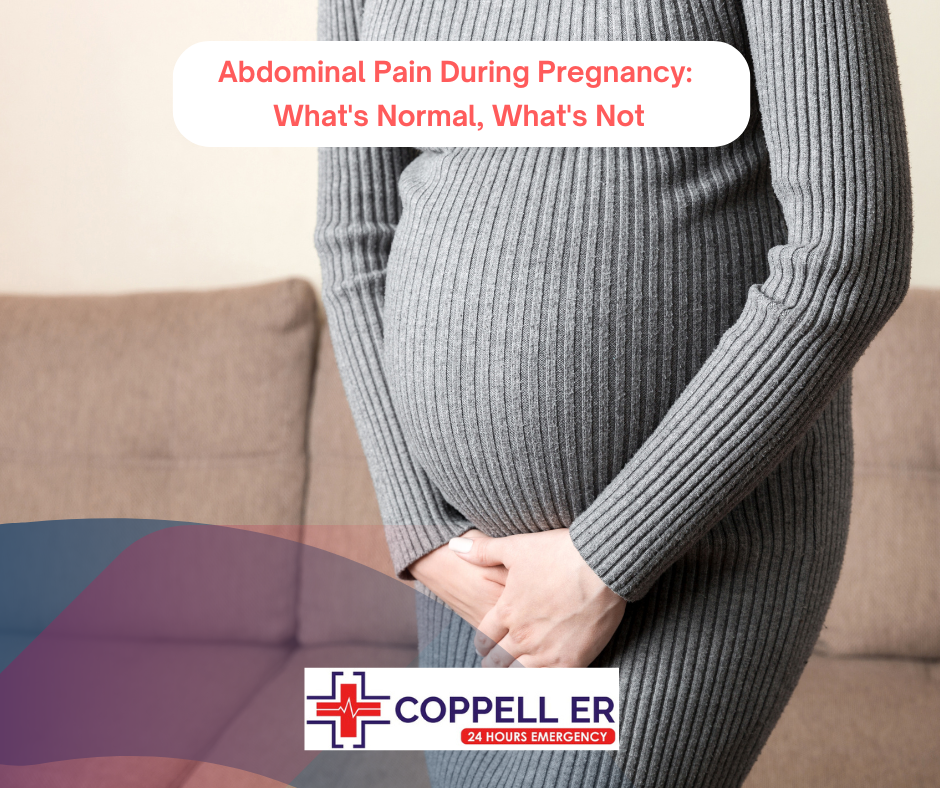When you’re pregnant, every new sensation can set off alarm bells. That little twinge in your belly – is it just your baby stretching out or something more serious?
Abdominal pain during pregnancy is common, but distinguishing between normal discomfort and potential complications isn’t easy. While stomach pain in pregnancy is often due to your uterus stretching to make room for your growing baby, it’s crucial to know when it might signal a problem.
This guide helps you identify common causes of pregnancy pain and potential red flags that require immediate attention. Armed with this knowledge, you’ll confidently sail through your nine-month journey, knowing when to stay calm and when to consult your doctor.
Guide to Abdominal Pain & Care
Common Causes of Abdominal Pain During Pregnancy

From constipation to round ligament pain, there are numerous harmless reasons for abdominal or stomach pain during pregnancy. While these are typically benign, persistent, severe pain, or symptoms like bleeding or intense cramping warrant urgent care.
Below are several common and usually harmless causes of abdominal pain during pregnancy:
Morning Sickness
Nausea during early pregnancy, commonly known as morning sickness, is typical and usually not concerning. It can begin as early as 2 to 4 weeks after fertilization, around the time your period is due or shortly after.
Symptoms generally peak between 9 and 16 weeks and usually subside by around 22 weeks of gestation. Morning sickness includes nausea and vomiting, which can be considered a form of normal abdominal pain in pregnancy.
Many pregnant individuals manage without medication, but sometimes morning sickness can become severe, a condition called hyperemesis gravidarum. If your symptoms are severe, it’s important to talk to your OB-GYN or healthcare provider.
Impact of Your Growing Uterus
As your uterus expands during pregnancy, it presses against your bowels. This can lead to nausea, a feeling of fullness even after eating small amounts, and a distended abdomen. This pressure can also cause abdominal pain during pregnancy.
To ease these symptoms, try eating smaller, more frequent meals instead of large ones. Regular exercise helps maintain digestive health and reduces discomfort.
Additionally, getting plenty of rest and emptying your bladder frequently can manage the impact of your growing uterus on your digestive system and improve your overall comfort during pregnancy.
Round Ligament Pain
As your uterus enlarges during pregnancy, it stretches the round ligaments. Round ligament pain usually starts between 18 and 24 weeks, around the time many pregnant people begin “showing.” It typically occurs on one side of your belly, though it can affect both sides.
This pain often feels like lower abdominal pain during pregnancy that radiates into the groin. It may be sharp and stabbing or dull and achy, but it usually only lasts a few seconds. Movements that stretch these ligaments, such as coughing, sneezing, laughing, or getting up suddenly, can trigger it.
Round ligament pain usually resolves on its own, but if it becomes very uncomfortable, you should consult your OB-GYN or healthcare provider for advice on managing the discomfort.
Constipation and Gas
Constipation and gas are common issues that often lead to abdominal pain during pregnancy. The hormone progesterone, which increases during this time, slows down your digestive system, causing food to move more slowly.
To help with constipation, drink plenty of water and eat fiber-rich foods. If that doesn’t work, your healthcare provider might recommend a stool softener or fiber supplement.
To reduce gas, you should avoid foods that cause it, such as carbonated drinks, spicy foods, fried foods, dairy products, and vegetables like cabbage, onions, and beans
Braxton Hicks Contractions
Braxton Hicks contractions are sporadic uterine contractions that can occur abdominal pain during pregnancy. They are typically mild and irregular, often feeling like a tightening or squeezing sensation in the abdomen. These contractions are usually painless and do not indicate that labor has begun.
They can start as early as the second trimester but are most commonly felt in the third trimester. Various factors such as dehydration, physical activity, or a full bladder can trigger them. Unlike true labor contractions, Braxton Hicks contractions do not increase in intensity or become rhythmic.
If you experience Braxton Hicks contractions, changing positions, resting, or drinking water may help alleviate them. However, if you’ve persistent or painful contractions, or if you’re concerned, it’s important to contact your healthcare provider for advice.
Serious Causes of Stomach Pain in Pregnancy

When experiencing abdominal pain during pregnancy, it’s essential to distinguish between normal discomfort and potentially serious conditions. While mild pain is common and usually harmless, severe symptoms require immediate evaluation at the emergency room.
Here are some important signs to watch out for: bleeding, severe pain, fever, and changes in vision. Keep reading to learn about serious causes of stomach pain during pregnancy.
Ectopic Pregnancy
Ectopic pregnancy occurs in about 1 out of 50 pregnancies, where the fertilized egg implants outside the uterus, often in the fallopian tube. Unfortunately, ectopic pregnancies cannot progress normally and require medical intervention.
If you have an ectopic pregnancy, which is rare, you experience severe lower abdominal pain during pregnancy and vaginal bleeding between the 6th and 10th weeks. Factors that increase the risk of ectopic pregnancy include previous ectopic pregnancies, endometriosis, tubal ligation, or having an intrauterine device (IUD) during conception.
Placental Abruption
Placental abruption is a serious condition where the placenta detaches from the uterus before the baby is born. One sign of this condition is constant pain that makes your stomach feel hard for a long time without relief.
Another indicator is the presence of bloody fluid or the premature breaking of your water. Other symptoms include tenderness in your abdomen, back pain, and fluid discharge with traces of blood.
Preterm Labor
If you experience regular contractions before 37 weeks of pregnancy and have a persistent backache or abdominal pain during pregnancy, you might be going into preterm labor. It’s important to call your OB-GYN or healthcare provider right away. These contractions might also come with leaking vaginal fluid or blood and decreased fetal movement.
Even if you’ve been pregnant before, it can be hard to tell the difference between Braxton Hicks contractions and true preterm labor. You might get sent home if it’s a false alarm, but it’s better to be safe than sorry.
Miscarriage
Sadly, 15 to 20 percent of pregnancies end in miscarriage, making it the most common type of pregnancy loss. Often referred to as “spontaneous abortion,” miscarriage usually occurs within the first 13 weeks.
Symptoms include mild to severe back pain, true contractions that happen every 5-20 minutes, brown or bright red bleeding with or without cramps, tissue or clot-like material passing from the vagina, and a sudden decrease in other pregnancy symptoms.
Preeclampsia
Preeclampsia and other hypertensive disorders affect 5% to 8% of all pregnancies, according to the Preeclampsia Foundation of America. It is characterized by high blood pressure and the presence of protein in the urine, typically developing after 20 weeks of pregnancy (which is why your blood pressure is monitored regularly).
High blood pressure narrows the vessels supplying oxygen and nutrients to the fetus, potentially affecting fetal growth. Preeclampsia also increases the risk of placental abruption.
Symptoms of severe preeclampsia include upper abdominal pain during pregnancy, nausea, headaches, swelling, and visual disturbances like flashing lights. If you suspect you may have preeclampsia, contact your OB-GYN immediately.
Urinary Tract Infection (UTI)
During pregnancy, UTIs are usually treatable but can lead to complications if not addressed promptly. Symptoms often include pain or burning during urination, along with lower abdominal discomfort.
If you notice pain in your lower back, sides beneath your rib cage, or above your pelvic bone, accompanied by fever, nausea, sweating, or chills, it may indicate that the UTI has spread to your kidneys. Seek emergency medical attention if you experience these symptoms.
Appendicitis
Appendicitis during pregnancy poses diagnostic challenges because the enlarging uterus causes the appendix to shift upward toward the belly button or liver. This altered positioning complicates identification, potentially delaying diagnosis and increasing the risk of complications.
Traditionally, appendicitis manifests with pain in the lower right abdomen. However, during pregnancy, this pain may be perceived higher up. Other symptoms include decreased appetite, nausea, and vomiting.
Gallstones
Gallstones are more prevalent in women, particularly those who are overweight, over 35, or have a history of gallstones. Nearly 8% of pregnant women develop gallstones. Treatment varies based on symptom severity and may include surgery, which can occasionally be postponed until after childbirth.
Pain from gallstones, or cholecystitis, is intense and typically occurs in the upper right section of the abdomen. In some instances, the pain extends to the back and beneath the right shoulder blade.
When to Worry About Abdominal Pain During Pregnancy
Abdominal pain during pregnancy can be concerning. It’s crucial to know when to seek medical attention. Here’re some key symptoms that warrant immediate care:
- Severe abdominal pain during pregnancy that doesn’t go away
- Vaginal bleeding, whether it comes with pain or not
- Regular contractions before 37 weeks of pregnancy
- Additional symptoms like fever, chills, nausea, vomiting, or dizziness
- Significant decrease in fetal movement
- Signs of preeclampsia such as upper abdominal pain, high blood pressure, headaches, or visual disturbances
- Suspected urinary tract infection that has spread to the kidneys—indicated by lower back pain, fever, and chills
Understanding these symptoms and seeking prompt attention is vital for both your health and your baby’s health.
For comprehensive and immediate treatment for abdominal pain during pregnancy, visit Coppell ER. Our expert medical staff, equipped with the latest technologies, prioritizes your concerns and provides the necessary care to ensure a healthy pregnancy.
Request an Appointment for Abdominal Pain Now
FAQs
Is it normal to have abdominal pain during pregnancy?
Stomach or abdominal pain during pregnancy are quite common and can happen at any time. In most cases, they’re nothing to worry about. However, sometimes they may signal a more serious issue. It’s important to know the symptoms to watch for in each trimester and when to seek medical assistance.
Which side of the stomach hurts in early pregnancy?
Lower abdominal pain during pregnancy is a common experience for many women. Early in pregnancy, this discomfort results from your body stretching to accommodate your growing baby or digestive issues. As pregnancy progresses, pain in the lower abdomen can be attributed to the stretching of abdominal ligaments, a kidney infection, or a urinary tract infection (UTI).
Can baby position cause abdominal pain?
Pain and discomfort are often caused by your baby changing position, your womb expanding as your baby grows, or the beginning of Braxton Hicks contractions.




